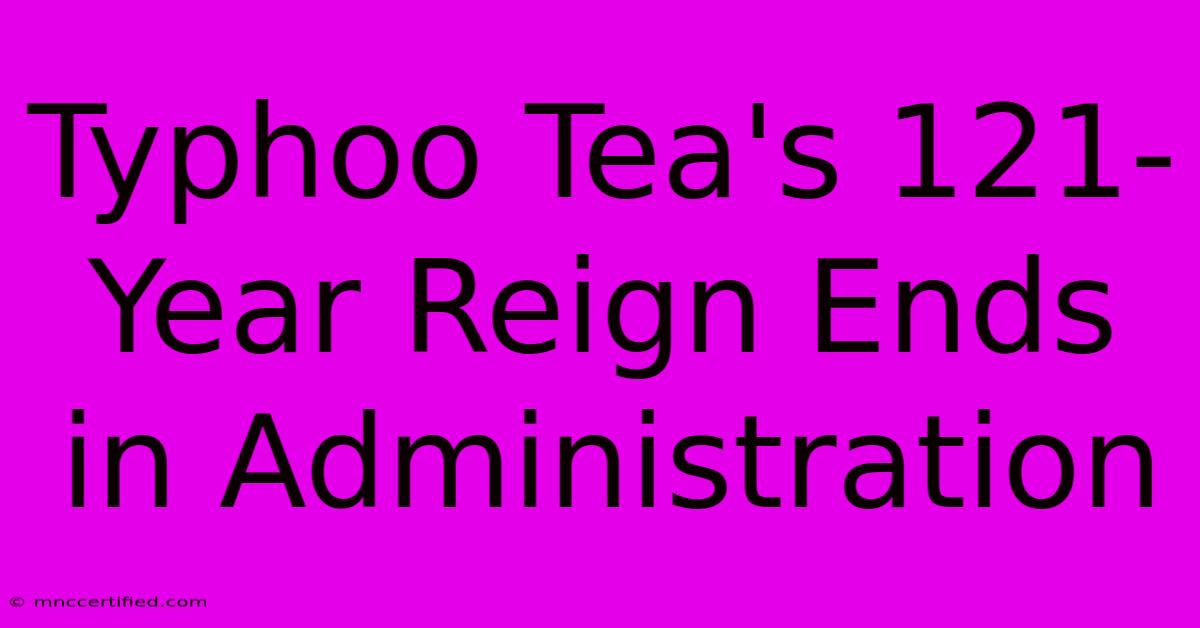Typhoo Tea's 121-Year Reign Ends In Administration

Table of Contents
Typhoo Tea's 121-Year Reign Ends in Administration: A Bitter Pill for British Tea Lovers
The iconic British tea brand, Typhoo, has been placed into administration after 121 years of brewing success. This news sent shockwaves through the UK and beyond, leaving many wondering about the future of this beloved beverage and the impact on the wider tea industry. This article delves into the reasons behind Typhoo's downfall, explores the potential consequences, and examines what this means for the future of British tea brands.
The Fall of a Tea Giant: Why Did Typhoo Fail?
Typhoo's administration marks a significant moment in British business history. While the exact causes are complex and still unfolding, several factors likely contributed to its demise:
1. Rising Costs and Inflation: The post-pandemic economic climate, characterized by soaring inflation and increased energy prices, significantly impacted Typhoo's profitability. The cost of raw materials, packaging, and transportation skyrocketed, squeezing profit margins. This is a challenge faced by many businesses, but particularly impactful on large-scale food and beverage producers.
2. Intense Competition: The tea market is fiercely competitive. Typhoo faced pressure from both established global brands and a surge of smaller, independent tea companies offering unique blends and ethically sourced products. This increased competition made it harder for Typhoo to maintain market share and pricing power.
3. Changing Consumer Preferences: Modern consumers are increasingly discerning, demanding ethically sourced products, sustainable packaging, and innovative flavors. Typhoo's failure to adapt quickly enough to these shifting preferences likely contributed to its decline. Consumers are actively seeking out brands that align with their values, and Typhoo may have lagged in this crucial area.
4. Supply Chain Disruptions: The global supply chain experienced significant disruptions in recent years, impacting the availability of raw materials and increasing lead times. This instability put further pressure on Typhoo's operations and profitability.
What Happens Next? The Future of Typhoo Tea
The immediate future for Typhoo remains uncertain. Administrators will be tasked with exploring options, including a potential sale to another company or a restructuring of the business. Several scenarios are possible:
- Acquisition: A larger food and beverage company might acquire Typhoo, leveraging its established brand recognition and distribution network. This could lead to a rebranding or revitalization of the product line.
- Restructuring: A restructuring could involve streamlining operations, reducing costs, and refocusing the brand strategy to better meet current consumer demands.
- Liquidation: In the worst-case scenario, Typhoo's assets could be liquidated, marking the end of an era for this iconic British brand.
Implications for the British Tea Industry
Typhoo's collapse sends a strong signal to other tea companies. It underscores the need for agility, innovation, and a strong focus on adapting to the evolving consumer landscape. Brands that fail to adapt to changing preferences and economic pressures may face similar challenges. This event highlights the importance of:
- Sustainable Sourcing: Consumers increasingly demand ethically and sustainably sourced products.
- Brand Innovation: Companies must continuously innovate to meet evolving consumer needs and preferences.
- Supply Chain Resilience: Building a resilient and robust supply chain is critical to withstand economic shocks.
A Bitter End? The Legacy of Typhoo
Typhoo's 121-year reign may be ending, but its legacy as a beloved British brand remains. Millions have enjoyed a cup of Typhoo tea, creating countless memories and associations with the brand. The outcome of the administration process will shape the future of this iconic brand, determining whether it can be revived or if its story will come to a definitive end. Only time will tell if this is truly the final chapter for Typhoo, or if it's simply a pause before the next brew.
Keywords: Typhoo Tea, administration, British tea, tea industry, economic downturn, competition, consumer preferences, supply chain, brand legacy, future of Typhoo, acquisition, restructuring, liquidation.

Thank you for visiting our website wich cover about Typhoo Tea's 121-Year Reign Ends In Administration. We hope the information provided has been useful to you. Feel free to contact us if you have any questions or need further assistance. See you next time and dont miss to bookmark.
Featured Posts
-
Walmart Black Friday Mac Book Deals
Nov 29, 2024
-
Nabers Teammate Loss Giants Vs Cowboys
Nov 29, 2024
-
Montgomery St Brown Lions Choice
Nov 29, 2024
-
Haises Health Rangers Concerns
Nov 29, 2024
-
Understanding The National Dog Show
Nov 29, 2024